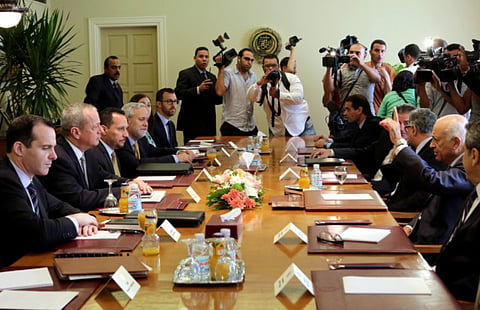US-Turkey tensions rise over Kobani
Turkey believes US fixation with Daesh has overtaken its interest in ousting Al Assad

Washington: US airstrikes alone cannot save the militant-besieged town of Kobani, along the Syria-Turkey border, the Pentagon said Wednesday, amid rising tensions between the Obama administration and its Turkish ally.
As American aircraft struck Daesh positions around Kobani for the third day in a row, senior administration officials expressed growing exasperation with Turkey’s refusal to intervene, either with its own military or with direct assistance to Syrian Kurdish fighters battling the militants.
But in a sign of their reluctance to directly antagonize Turkey on the eve of a key diplomatic meeting, US officials sent mixed signals on Ankara’s principal demand - that the United States establish a protected buffer zone along Turkey’s border with Syria.
“It is not now on the table as a military option that we’re considering,” Pentagon press secretary Rear Adm. John Kirby said.
Separately, Secretary of State John Kerry said that the idea of a buffer zone was “worth looking at very, very closely” and that it would be discussed when retired Gen. John Allen, coordinator of the US-led coalition against Daesh forces in Iraq and Syria, holds high-level meetings in Turkey on Thursday.
Britain and France, whose forces are conducting airstrikes against the militants in Iraq but not in Syria, also said they would not rule out a buffer zone.
French President Franois Hollande went one step further, announcing after a telephone conversation with his Turkish counterpart that he supported the proposal made by President Recep Tayyip Erdogan.
The disconnect between US and Turkish strategies is a reflection of differing goals - with the United States aiming to stop a terrorist threat and Turkey focusing on concerns that are much closer to home.
Turkey’s refusal to help the Syrian Kurds defending the town is based in part on the Turks’ long and convoluted history with the Kurdish Workers Party, the PKK, separatist militants in Turkey’s own Kurdish region. The PKK is affiliated with the Syrian Kurdish political movement whose military wing is defending Kobani.
Both Kurdish organizations are historically affiliated with Syrian President Bashar Al Assad, whose ouster is Turkey’s primary, long-term objective in Syria.
At a widely reported “secret” meeting in Ankara this week, Turkey set out three conditions for supporting the Kobani fighters - that they abandon Al Assad, dismantle the self-governing cantons they have established along Turkey’s border and pledge not to threaten that border.
“Ankara wants to see the PKK weaken in Syria so the organization comes to the bargaining table from a position of weakness,” said Soner Cagaptay of the Washington Institute for Near East Policy.
But Turkey has already seen considerable domestic backlash over its position on Kobani. Protests erupted throughout the country’s Kurdish southeast this week on a scale not seen since the 1990s, with 19 people reported dead.
The issue of a buffer zone along the border has been repeatedly raised by Turkey since Syria’s civil war began in 2011.
The buffer zone was initially proposed to counter Al Assad’s own air attacks against US-backed Syrian opposition forces, largely in the western part of Syria. Turkey and others proposed a “no-fly zone” in which patrolling US aircraft would prevent Al Assad’s air force from attacking a protected area for opposition fighters and a corridor to funnel humanitarian aid to civilians.
The administration, with strenuous insistence from the Defense Department, consistently argued that Al Assad’s air defenses made it too risky, the resources required for constant air patrols were too great, and the strength and reliability of the opposition were questionable. It was the rise of Daesh, in northern and eastern Syria, and its entry into neighboring Iraq, that provoked the US air campaign, and destroying Daesh in both countries is the immediate US objective. Al Assad is not bombing Daesh positions, and the militants themselves have no air force, making a no-fly zone irrelevant to the US goal.
Turkey believes that a US fixation with Daesh has overtaken American interest in ousting Al Assad. The Turks have given no indication that they are prepared to participate in the coalition campaign in Syria unless Washington agrees to further the Turkish objective of removing the Syrian leader.
In a speech Tuesday, Erdogan spelled out Turkey’s conditions: the creation of both no-fly and buffer zones along its border with Syria - to protect the opposition rebels and to host more than 1.5 million Syrian refugees who have swarmed into Turkish towns - and training and arming the rebels. Obama has already said the US military will begin a training program, which will take at least a year to put fighters in the field, and to step up its arms shipment.
“It’s all about keeping the removal of Al Assad as the priority,” Turkish political analyst Soli Ozul said.



